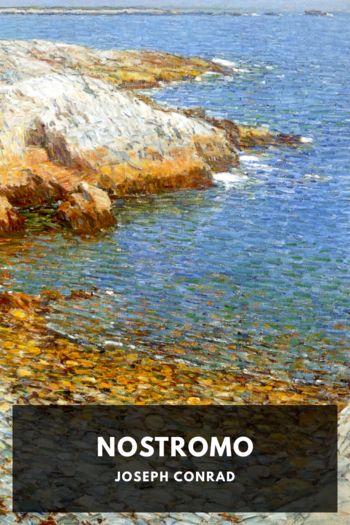Nostromo - Joseph Conrad (books to read fiction .TXT) 📗

- Author: Joseph Conrad
Book online «Nostromo - Joseph Conrad (books to read fiction .TXT) 📗». Author Joseph Conrad
The great man, massive and benignant, had been looking at him thoughtfully; when he broke the short silence it was to remark that concessions flew about thick in the air of Costaguana. Any simple soul that just yearned to be taken in could bring down a concession at the first shot.
“Our consuls get their mouths stopped with them,” he continued, with a twinkle of genial scorn in his eyes. But in a moment he became grave. “A conscientious, upright man, that cares nothing for boodle, and keeps clear of their intrigues, conspiracies, and factions, soon gets his passports. See that, Mr. Gould? Persona non grata. That’s the reason our government is never properly informed. On the other hand, Europe must be kept out of this continent, and for proper interference on our part the time is not yet ripe, I dare say. But we here—we are not this country’s government, neither are we simple souls. Your affair is all right. The main question for us is whether the second partner, and that’s you, is the right sort to hold his own against the third and unwelcome partner, which is one or another of the high and mighty robber gangs that run the Costaguana Government. What do you think, Mr. Gould, eh?”
He bent forward to look steadily into the unflinching eyes of Charles Gould, who, remembering the large box full of his father’s letters, put the accumulated scorn and bitterness of many years into the tone of his answer—
“As far as the knowledge of these men and their methods and their politics is concerned, I can answer for myself. I have been fed on that sort of knowledge since I was a boy. I am not likely to fall into mistakes from excess of optimism.”
“Not likely, eh? That’s all right. Tact and a stiff upper lip is what you’ll want; and you could bluff a little on the strength of your backing. Not too much, though. We will go with you as long as the thing runs straight. But we won’t be drawn into any large trouble. This is the experiment which I am willing to make. There is some risk, and we will take it; but if you can’t keep up your end, we will stand our loss, of course, and then—we’ll let the thing go. This mine can wait; it has been shut up before, as you know. You must understand that under no circumstances will we consent to throw good money after bad.”
Thus the great personage had spoken then, in his own private office, in a great city where other men (very considerable in the eyes of a vain populace) waited with alacrity upon a wave of his hand. And rather more than a year later, during his unexpected appearance in Sulaco, he had emphasized his uncompromising attitude with a freedom of sincerity permitted to his wealth and influence. He did this with the less reserve, perhaps, because the inspection of what had been done, and more still the way in which successive steps had been taken, had impressed him with the conviction that Charles Gould was perfectly capable of keeping up his end.
“This young fellow,” he thought to himself, “may yet become a power in the land.”
This thought flattered him, for hitherto the only account of this young man he could give to his intimates was—
“My brother-in-law met him in one of these one-horse old German towns, near some mines, and sent him on to me with a letter. He’s one of the Costaguana Goulds, purebred Englishmen, but all born in the country. His uncle went into politics, was the last provincial president of Sulaco, and got shot after a battle. His father was a prominent business man in Sta. Marta, tried to keep clear of their politics, and died ruined after a lot of revolutions. And that’s your Costaguana in a nutshell.”
Of course, he was too great a man to be questioned as to his motives, even by his intimates. The outside world was at liberty to wonder respectfully at the hidden meaning of his actions. He was so great a man that his lavish patronage of the “purer forms of Christianity” (which in its naive form of church-building amused Mrs. Gould) was looked upon by his fellow-citizens as the manifestation of a pious and humble spirit. But in his own





Comments (0)